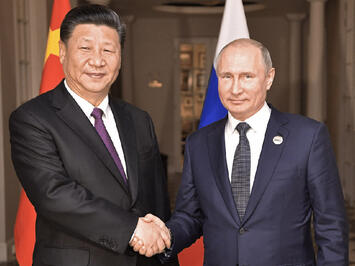
The current crises in eastern Europe reflect more than just Kremlin mischief-making—they reflect the first fruits of an emerging world order that spans the vastness from Beijing to Berlin. Unlike the longstanding liberal status quo, with its roots in classical civilization and the Enlightenment, this emerging alternative draws upon a mélange of German geopolitics, the legacy of Chinese emperors, the Mongols, and Orthodox Russian autocracy. For now, the new Eurasian ascendency encompasses Russia and its expanding list of recovered satellites, as well as China, the world’s premier dictatorship and workshop. But it also now threatens to include Germany, a development that would bring a militarily strong and resource-rich state into alliance with the world’s second and fourth largest economies.
Although the Germans have not yet conceded their ties to liberal democracy, the new Eurasian alliance possesses a magnetic appeal, and shares a common distaste for Anglo-Saxon liberalism. After all, Russia supplies much of Europe’s gas—critical at a time of regulatory-driven energy shortages, and soon to be bolstered by the Nord Stream 2 pipeline—while China has emerged as Germany’s largest export market. The niceties of democracy may be scrupulously observed, but in the end, money talks, along with power, and more than a little anti-American revanchism.
The emerging Eurasian century has ushered in a springtime for dictators who look not to John Locke or James Madison for inspiration, but to autocratic Eastern and Islamic antecedents like the Ottomans, Imperial China, and the Tsars. Democracy, according to a report from Freedom House, is at a generational low-ebb even in Europe. Adjacent Eurasian countries, for the most part, have adopted “hybrid regimes” that combine some democratic norms, such as elections, with authoritarian controls.
A quarter-century ago, the late political scientist Samuel Huntington warned that we were entering an era of geopolitical resentment caused by the West’s perceived mistreatment and humiliation of rival powers, and its attempts to restructure “the world community” in accordance with its own interests. China, in particular, has nurtured an appetite to recover the mighty perch that Confucian civilization once occupied. As late as the 17th century, China was not only more populous and richer than Europe, it also enjoyed an industrial infrastructure that was, at the very least, Europe’s equal.
Liberal capitalism overthrew that order, as Europe’s share of global GDP rose from 17.8 to 33 percent between 1500 and 1913, and China’s share dropped from 25 to eight percent. By 1913, Western Europe’s per capita GDP was roughly seven times that of China or India, while the per capita GDP of the United States surpassed that of these large and venerable nations by a factor of nine.
Reversing this state of affairs has been a key objective of China’s leaders ever since. Having opened its economy under the pragmatic doctrines of “socialism with Chinese characteristics” ushered in by Deng Xiaoping, China rose from a negligible part of global GDP in 1980 to 13 percent in 2010. It is projected to reach over 20 percent by 2026. Once awed by the West, Huntington perceived that Asian societies now ascribe their ascendency to “superior culture.” In seeking to reduce their dependence on the old capitalist powers, they would make alliances largely with powers outside the grip of Western liberalism, notably the Islamic states of Pakistan and Iran as well as Russia.
Now the undisputed leader of Eurasia, China achieved its re-emergence without adopting individual political and property rights—the lodestars of Western liberalism once thought to be necessary preconditions to national progress and growth. Today, China is no more likely to become a constitutional democracy than it was under the Mongols or their 14th-century Ming successors. Instead, it has evolved into the model autocracy, based on a system of semi-permanent caste privilege and a technologically enhanced regime of social control. It employs ever-more intrusive means to impose strict censorship, and offers few privacy protections. “If the US has long sought to make the world safe for democracy,” suggests one analyst, “China’s leaders crave a world that is safe for authoritarianism.”
Read the rest of this piece at Quillette.
Joel Kotkin is the author of The Coming of Neo-Feudalism: A Warning to the Global Middle Class. He is the Roger Hobbs Presidential Fellow in Urban Futures at Chapman University and Executive Director for Urban Reform Institute. Learn more at joelkotkin.com and follow him on Twitter @joelkotkin.
Photo: Vladimir Putin and Xi Jinping, July 26th, 2018, Wikimedia Commons












